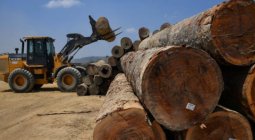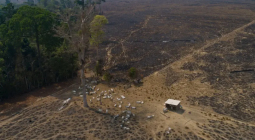Indonesia says Cop26 zero-deforestation pledge it signed ‘unfair’

Environment minister of country home to world’s third-biggest rainforest says deforestation pledge must not halt development
Indonesia has questioned the terms of a Cop26 deal to end deforestation by 2030, days after joining more than 100 countries in signing up to it.
The nations agreed on the multi-billion-dollar plan at the climate conference in Glasgow this week to stop cutting down trees on an industrial scale in under a decade.
But Siti Nurbaya Bakar, the environment minister for the south-east Asian archipelago, which is home to the world’s third-biggest rainforest, said on Wednesday that “forcing Indonesia to zero deforestation in 2030 is clearly inappropriate and unfair”.
She said that there were multiple ways to define deforestation, and that any deal could not halt economic growth. “The massive development of President Jokowi’s era must not stop in the name of carbon emissions or in the name of deforestation,” she said, referring to Joko Widodo by his nickname.
Bakar said Indonesia could not “promise what we can’t do” and that Indonesia’s priority was development, taking the example of forests that needed to be cut down to build new roads. The government has also stated that some forests will need to be cut down for the cultivation of food crops.
“Indonesia’s natural wealth, including forests, must be managed for its use according to sustainable principles, besides being fair,” she said.
Indonesia’s deputy foreign affairs minister, Mahendra Siregar, said that describing the deal as a zero-deforestation pledge was “false and misleading”.
Indonesia is home to the world’s third-largest expanse of tropical forest cover, but rampant deforestation since the 1960s has seen half of the country’s forests cut down by illegal loggers and to make way for commercial plantations such as palm oil.
The country has recently set itself ambitious targets for deforestation, including halving the deforestation rate over the next three decades as well as reforesting 26.2m acres of land by 2050. Last year saw the lowest rate of deforestation in Indonesia since the 1990s, which the government credited to new policies regulating forest clearance.
However, the recent pledges are at odds with development projects approved by the Indonesian government, which will likely see 135.9m acres of forest cut down by 2040.
In the declaration signed by Indonesia and more than 100 countries, leaders committed “to working collectively to halt and reverse forest loss and land degradation by 2030 while delivering sustainable development and promoting an inclusive rural transformation”.
British prime minister Boris Johnson said the agreement was pivotal to the overarching goal of limiting temperature rises to 1.5 degrees Celsius in a bid to slow global warming.
A spokesperson for Johnson said he did not see a contradiction in Indonesia’s statements.
“My understanding of what the Indonesian government has said is that they need to be able to continue legal logging and agriculture to support their economic development,” the spokesperson said.
“It would be consistent with the pledge – what countries have committed to is to end net deforestation, ensuring that any forest lost is replaced sustainably.”
Kiki Taufik, a forests campaigner with Greenpeace in Indonesia, regretted that the environment minister supported “large scale developments which clearly have the potential for environmental destruction”. “If we do not take immediate and substantial action to stop deforestation … we cannot achieve our modest emissions reductions goals,” he said.
Although its rate of deforestation has slowed markedly since 2015, Indonesia’s vast forests are still shrinking.
According to Global Forest Watch, Indonesia in 2001 had 93.8m hectares (230m acres) of primary forest – ancient forests that have largely not been disturbed by human activity – an area about the size of Egypt. By 2020, that area had decreased by about 10%.
5 November 2021
The Guardian




